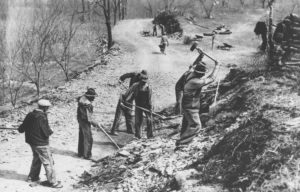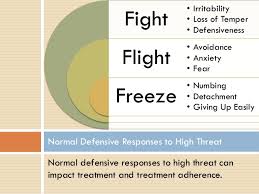By all sorts of measures, we live in an amazing time of prosperity and health. Life expectancy has doubled in the past century. The number of people living below the poverty level was been cut in half since 1990 and continues to fall. Crime rates are generally down worldwide. Over 40% of the people on earth has an internet connection today, up from 1% 15 years ago. It truly is an amazing time to be alive.

Yet, on social media, negative and often false commentary is everywhere and gets repeated over and over again. For many people, the constant drone of the negative comments, affects them to the point where they have developed a sort of general, non-specific fear. They can’t specifically tell you what exactly they are afraid of other than with words like, them, technology, the government, un-named terrorists, and the like.
In the circumstance of an immediate, real danger, fear can save your life. But if the danger is not immediate or the danger is not real, you could start/continue living a life of fear and that is not a good thing. The question this post is looking at is if “the only thing we have to fear is…fear itself”
The actual quote is from the opening line of the short speech Franklin D. Roosevelt gave at his first inauguration in 1933:

We were three years into the Great depression when Roosevelt was elected in 1932 and the end was not in site. Roosevelt got elected in a landslide on a message that fear was preventing action from being taken to get the economy going. Roosevelt’s New Deal, instituted unprecedented programs for relief, recovery and reform which led to years of economic growth.

Fear is a feeling caused by a perceived threat. When you feel fear, your brain is designed to do one of three things:
- Confront the threat
- Escape from / avoid the threat
- In extreme cases freeze (paralysis)

If a threat is immediate and real, fear causes you to react quickly to save your life. Hey, there is a big hungry looking bear right over there: I have fear. My brain is wired to tell me to quickly choose one of these three choices,
- Run away
- Try to scare the bear away
- Freeze in place and hope the bear does not see you.
In real life it is pretty rare for us to be in a situation where a split second decision between fight, flight or freeze makes sense.
In real life, we almost always have time to make rational choices from several available options. Yes, there is a big hungry bear within 20 feet but you are in a Zoo. You are safe so no need for a reaction based on fear. Even in cases where there is real danger, if you have more than a couple seconds time, you can choose a course of action which mitigates the danger rather than limiting your options to fear’s, fight/flight/freeze. That swing looks scary. Take a second to think about it. If you hold on tight, you will be fine and have fun in the bargain.
There are lots social media posts which are specifically designed to make you afraid. They want you to take immediate action and inducing fear is a way to get you to do that. After all, taking immediate action when you are in danger is the purpose of feeling fear. The trick for dealing with this attempt to make you feel fear is not to fall for the trick. You have time to consider your options, you don’t need to make a split second decision. Fear is an available option but you choose a different option.
Here are some reactions you might consider rather than fear.
- You glance at a post; it does not interest you so you ignore it. Don’t get emotionally invested in it. Just go to the next post.
- If you know or suspect that a post is false (a lie), don’t spread it around. It is bad form to spread shit around and makes you a bad neighbor. Let it die from lack of interest.
- You read the post and wonder if it is true or not. Check it out. Like any good researcher, start with the assumption it is false. Recognize that if you question if it is true, it probably is not true. Trust yourself. But if you care enough to check it out. Google it. Look it up in Wikipedia. Does it say it is a hoax? Check other places. Does it make sense. Make a rational choice to accept it or reject it.
- You might discover that it is true, but then ask yourself, even if it is true, does it matter to me. Do I care enough to support it? Lots of things are true but really not relevant to you. (Person you never met and likely never will meet, got caught cheating on spouse and they got a divorce)
Remember there are good reasons social media is so popular. The connection established with others can be a very good thing. Sharing with others is a good thing. It can be an interesting, productive way to pass time and still be connected with friends. So for what it is worth, here are somethings I suggest.
- Don’t hesitate to ask for emotional support from your online friends or give an online friend support. That is what being a friend is all about.
- Your social media friends are real people with whom you are connecting in a real way. That is a good thing. Don’t pretend they are not real people.
- Don’t hesitate to share honest stuff with others about yourself or about people close to you or on topics you care about. I assume you all like seeing stuff about my grandchildren and other people close to me. I consider it part of the deal that you share part of your life also.
- Feel free to give opinions but understand that online, just like in person, people actually do judge you by the opinions you post. If you want to express an opinion but are not sure about it, just say so. Maybe something like: I am not sure how I feel exactly but I sure wonder about the direction the local school board is heading.
- You are human and so are others. None of us are perfect and most of don’t even want to be perfect. Don’t expect perfection in yourself or others. The best we can do is the best we can do.
My point is not to tell you how to feel other than to say fear should be saved for an emergency. Next time you read some crazy ass thing, fear not, ignore it or investigate it. If you investigate it, decide then how you feel and what next steps, if any, you want to take.
Conclusion
Living in fear is not a good choice to make. I think Roosevelt was right: “… the only thing we have to fear is…fear itself — nameless, unreasoning, unjustified terror which paralyzes needed efforts to convert retreat into advance.”